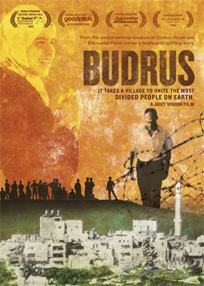Critical response
As of January 15, 2011, Budrus received on Rotten Tomatoes an overall rating of 95% from all critics (19 fresh and 1 rotten). [17]
During the first week of its release in the UK (September 24, 2010), Budrus ranked No. 1 on the British-based film review website, The Critic List, which includes top critics from Total Film, The Guardian , TimeOut London, Little White Lies – Independent Film Magazine , and The Evening Standard . [18] Tom Dawson of Total Film gave the film four stars and called it "a timely testimony to the power of peaceful resistance." [19] Peter Bradshaw of The Guardian gave Budrus four out of five stars stating that "this involving film is an eye-opener." He also argues that "what is so arresting about Bacha's film is that it shows something about the Israeli wall that I hadn't grasped. It doesn't just simply separate the Israelis from the Palestinians, but wanders on to the Palestinian territory, meandering and looping around: the idea is not merely to stop movement into Israel but covertly to impose paralysis within the Palestinian zone itself." [20] Tom Huddleston of TimeOut London gave it four out of five stars and argues that, "In refusing to romanticise the villagers or demonise their aggressors, she presents a stark and wholly believable portrait of the Middle East conflict in microcosm, while her welcome focus on character over political point-scoring gives Budrus a weighty emotional kick." [21] Liz Haycroft of Little White Lies – Independent Film Magazine gave Budrus three out of five stars and states, "By incorporating interviews with an Israeli Border Police captain and a spokesman from the military police, Budrus presents a relatively balanced view of the dispute, particularly for those unfamiliar with the regional politics. And yet from the very beginning, it’s difficult to fathom how one country can enter a region and declare parts of it their own, without expecting some kind of resistance. The people of Budrus, and their choice of peaceful protest, can only be admired." [22] Derek Malcolm of The Evening Standard gave the film four out of five stars and notes that the "film seems designed to prove what can be done by relatively peaceful means. But it is at its best when we see how Morror gradually moves into a position of moral strength. You can scarcely believe the foolishness of the Israeli authorities, but you never get the sense that the film is taking sides." [23] In addition, Budrus received four stars from The Daily Telegraph [24] and the Financial Times . [25]
In the United States, Budrus was listed as a "Critic's Pick" by New York Magazine [26] and Ann Hornaday of The Washington Post . [27] Hornaday later questioned why Budrus was "inexplicably left off" the Oscars nomination list for best documentary stating that "if there was an Arab-Israeli "slot" in the noms, my nod would have gone to Budrus." [28] Kenneth Turan of the Los Angeles Times called Budrus a "surprisingly heartening" film and stated that, "What's most gratifying about "Budrus" is that the film enables us to feel some of the same emotions the participants experienced." [29] Michael Phillips of the Chicago Tribune gave Budrus three and a half stars referring to it as "Julia Bacha's fine, humane documentary" that "makes you believe people can get things done, if they think in terms of coalitions and principles and methods other than brute force." [30] Mike Hale of The New York Times called Budrus an "engrossing and sometimes inspiring" film and stated that it is, " Eyes on the Prize with olive trees." [31] Ella Taylor of The Village Voice referred to Budrus as, "Julia Bacha’s mostly fair-minded documentary." [32] Alissa Simon of Variety called Budrus a "poignant" and "inspiring" documentary. While she argued that the "pic fails to provide a sense of chronology" or the impact of the demonstrations on everyday life, Simon also stated that, "these are small criticisms when compared to the pic's useful analysis of what constitutes model conflict resistance." [33] Chuck Bowen of Slant Magazine gave the film two and half out of four stars arguing that, "Budrus is passionately, more-than-competently made, but it's a civics lesson that doesn't quite shake you to your core." [34] Nick Schager of Time Out New York gave the film two out of five stars and argued that, "documentaries warrant viewpoints, but they should also provide perspective on more than one side of a contentious issue." [35]
